|
Dolce far niente
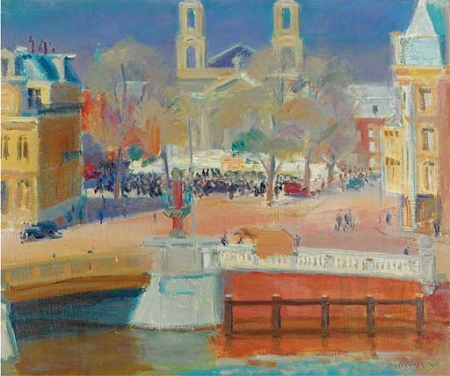
Waterlooplein vanaf de Amstel door Bob Buys, 1946
Waterlooplein
Al wat er mijn gevoelens zijn
Ligt op dit ordeloze plein
te koop als rommel en oud roest,
als oud fornuis, finaal verwoest.
Maar, als ik weer beginnen moest,
zou ik opnieuw een dichter zijn,
maar niet meer met zo'n trotse mond,
meer een hyena of een hond...
Het volk, als ik het goed bekijk,
ligt aan mijn voeten als burger-lijk.
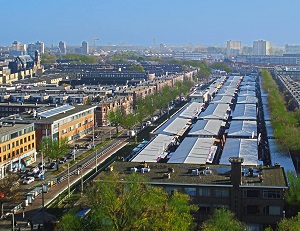
Gerard den Brabander (3 juli 1900 – 4 februari 1968)
De markt in Den Haag, de geboorteplaats van Gerard den Brabander
De Engelse dichter en schrijver Ted Hughes werd geboren op 17 augustus 1930 in Mytholmroyd, Yorkshire. Zie ook alle tags voor Ted Hughes op dit blog.
After Lorca
The clock says “When will it be morning?”
The sun says “Noon hurt me.”
The river cries with its mouthful of mud
And the sea moves every way without moving.
Out of my ear grew a reed
Never touched by mouth.
Paper yellows, even without flame,
But in words carbon has already become diamond.
A supple river of mirrors I run on
Where great shadows rise to the glance,
Flowing all forward and bringing
The world through my reflection.
A voice like a ghost that is not
Rustle that dead in passage
Leaving the living chilled,
Wipe clear the pure glass of stone.
Wipe clear the pure stone of flesh.
The Ancient Heroes and the Bomber Pilot
With nothing to brag about but the size of their hearts,
Tearing boar-flesh and swilling ale,
A fermenting of huge-chested braggarts.
Got nowhere by sitting still
To hear some timorous poet enlarge heroisms,
To suffer their veins stiffle and swell —
Soon, far easier, imagination all flames,
In the white orbit of a sword,
Their chariot-wheels tumbling the necks of screams,
In a glory of hair and beard,
They thinned down their fat fulsome blood in war,
Replenish both bed and board,
Making their own good news, restuffing their dear
Fame with fresh sacks-full of heads,
Roaring, burdened, back over the wet moor.
When archaeologists dig their remainder out —
Bits of bone, rust —
The grandeur of their wars humbles my thought.
Even though I can boast
The enemy capital will jump to a fume
At a turn of my wrist
And the huge earth be shaken in its frame —
I am pale.
When I imagine one of those warriors in the room
And hear his heart-beat burl
The centuries are a stopped clock; my heart
Is cold and small.
Theology
“No, the serpent did not
Seduce Eve to the apple.
All that’s simply
Corruption of the facts.
Adam ate the apple.
Eve ate Adam.
The serpent ate Eve.
This is the dark intestine.
The serpent, meanwhile,
Sleeps his meal off in Paradise —
Smiling to hear
God’s querulous calling.”
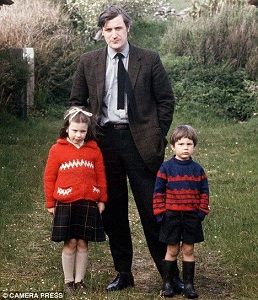
Ted Hughes (17 augustus 1930 – 28 oktober 1998)
Hier met dochter Frieda en zoon Nicholas, ca.1965
De Britse schrijver Sir Vidiadhar Surajprasad Naipaul werd geboren op 17 augustus 1932 in Chaguanas, Trinidad en Tobago. Zie ook alle tags voor V. S. Naipaul op dit blog. V. S. Naupaul stierf op 11 augustus jongstleden op 85-jarige leeftijd.
Uit: A Bend In the River
`I had done a little acting at the university — that had begun with a walk-on part in a little film somebody had made about a boy and girl walking in a park. I fell in with the remnants of that group in London and began to do a certain amount of acting. Not in any important way. London is full of little theatrical groups. They write their own plays, and they get grants from firms and local councils here and there. A lot of them live on the dole. Sometimes I played English parts, but usually they wrote parts for me, so that as an actor I found myself being the kind of person I didn't want to be in real life. I played an Indian doctor visiting a dying working-class mother; I did another Indian doctor who had been charged with rape; I was a bus conductor no one wanted to work with. And so on. Once I did Romeo. Another time there was an idea of rewriting The Merchant of Venice as The Mahndi Banker, so that I could play Shylock. But it became too complicated. `It was a Bohemian life, and it was attractive at first. Then it became depressing. People dropped out and took jobs and you understood that they had had pretty solid connections all along. That was always a let-down, and there were times during those two years when I felt lost and had to fight hard to hold on to that mood that had come to me beside the river. Among all those nice people I was the only real drop-out. And I didn't want to be a drop-out at all. I'm not running these people down. They did what they could to make room for me, and that is more than any outsider can say for us. It's a difference in civilization. `I was taken one Sunday to lunch at the house of a friend of a friend. There was nothing Bohemian about the house or the lunch, and I discovered that I had been invited for the sake of one of the other guests. He was an American and he was interested in Africa. He spoke about Africa in an unusual way. He spoke of Africa as though Africa was a sick child and he was the parent. I later became very close to this man, but at that lunch he irritated me and I was rough with him. This was because I had never met that kind of person before. He had all this money to spend on Africa, and he desperately wanted to do the right thing. I suppose the idea of all that money going to waste made me unhappy. But he also had the simplest big-power ideas about the regeneration of Africa. `I told him that Africa wasn't going to be saved or won by promoting the poems of Yevtushenko or by telling the people about the wickedness of the Berlin Wall. He didn't look too surprised. He wanted to hear more, and I realized I had been invited to the lunch to say the things I had been saying. And it was there that I began to understand that everything which I had thought had made me powerless in the world had also made me of value, and that to the American I was of interest precisely because I was what I was, a man without a side.”

V. S. Naipaul (17 augustus 1932 – 11 augustus 2018)
De Duitse schrijver en theatermaker Nis-Momme Stockmann werd geboren op 17 augustus 1981 in Wyk auf Föhr.Zie ook alle tags voor Nis-Momme Stockmann op dit blog
Uit: Der Fuchs
„Ich sah die Menschen auf den anderen Dächern in der Ferne fast unbeweglich verharren. Als hätten sie sich für ein prätentiöses Kunstprojekt mit dem Titel «Unbegreiflich» für einen extrem gut ausgestatteten chinesischen Fotokünstler aufgestellt. So standen wir, für einander nur Strichmännchen in der Ferne, alle zusammen auf unseren sauberen, stabilen Dächern.
– Gerettet und verloren zugleich –
Ich dachte an Katja (aber um sie machte ich mir keine Sorgen), ich dachte an Diego, an meinen Vater und am stärksten – was mich überraschte – an meinen Bruder. Ob er es wohl geschafft hatte? Reini hätte heute Morgen mit den paritätischen Werkstätten Kartoffeln ernten sollen. Er und die anderen Jungs «mit hohem Unterstützungsbedarf». Aber eigentlich war ich mir sicher, dass er okay war: Das Heim war das höchste Haus im Ort, und das Einzige, was Reini wirklich ausgezeichnet konnte, war schwimmen. Ich stellte mir vor, wie er prustend lange Bahnen zwischen den Häusern schwamm und den Leuten auf den Dächern sein käsiges «Reini grüüüßt» zurief.
Das Bier aus Dogges Notfallkiste war schon fast leer. Jütte kochte uns Dosenravioli auf einem kleinen blauen Gaskocher. Dogge zog seine riesigen Stiefel aus und hängte seine schwarzen Füße ins Wasser.
«Warum hast du eine Notfallkiste auf dem Dach?», fragte Jütte.
«War doch klar», sagte er mit träger Zunge.
«Was?»
«Das Ganze.»
Er griff in die Kiste und holte ein in einen erstaunlich soliden selbstgenähten Schoner eingeschlagenes Gewehr hervor.
«Du hast eine Waffe in der Kiste!?», fragte Jütte empört.
«Jep», sagte Dogge.
«Was willst du denn mit einer Waffe, verdammte Axt!»
«Schießen», sagte er, «und bei Gelegenheit angeben.»
«Ich glaub es nicht: eine Waffe, er hat eine Waffe auf dem Dach!»
Sie ging zur Kiste und wühlte eine Weile darin herum.“

Nis-Momme Stockmann (Wyk, 17 augustus 1981)
De Amerikaanse schrijver en essayist Jonathan Franzen werd geboren op 17 augustus 1959 in Western Springs, Illinois. Zie ook alle tags voor Jonathan Franzen op dit blog.
Uit: Purity
“Renewable Solutions didn't make or build or even install things. Instead, depending on the regulatory weather (not climate but weather, for it changed seasonally and sometimes seemingly hourly), it "bundled," it "brokered," it "captured," it "surveyed," it "client-provided." In theory, this was all very worthy. America put too much carbon into the atmosphere, renewable energy could help with that, federal and state governments were forever devising new tax inducements, the utilities were indifferent-to-moderately-enthusiastic about greening their image, a gratifyingly non-negligible percentage of California households and businesses were willing to pay a premium for cleaner electricity, and this premium, multiplied by many thousands and added to the money flowing from Washington and Sacramento, minus the money that went to the companies that actually made or installed stuff, was enough to pay fifteen salaries at Renewable Solutions and placate its venture-capitalist backers. The buzzwords at the company were also good: collective, community, cooperative. And Pip wanted to do good, if only for lack of better ambitions. From her mother she'd learned the importance of leading a morally purposeful life, and from college she'd learned to feel worried and guilty about the country's unsustainable consumption patterns. Her problem at Renewable Solutions was that she could never quite figure out what she was selling, even when she was finding people to buy it, and no sooner had she finally begun to figure it out than she was asked to sell something else.
At first, and in hindsight least confusingly, she'd sold power-purchase agreements to small and midsize businesses, until a new state regulation put an end to the outrageous little cut that Renewable Solutions took of those. Then it was signing up households in potential renewable energy districts; each household earned Renewable Solutions a bounty paid by some shadowy third party or parties that had created an allegedly lucrative futures market.”
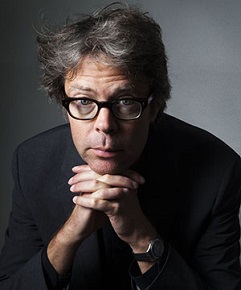
Jonathan Franzen (Western Springs, 17 augustus 1959)
De Cubaanse dichteres María Elena Cruz Varela werd op 17 augustus 1953 geboren in Colón. Zie ook alle tags voor María Elena Cruz Varela op dit blog.
Gedicht van de slingeraar
Ik slinger stenen tegen het dove oor.
Het veranderlijke oor. Van beide werelden.
Dit is de eenzaamheid met haar geknetter.
Ik geef signalen naast de geduldige dwaas die op de heuvel ligt en met de arme gek die haar zorgen oplapt op een bank in het park.
Door de afgepeigerde vingers. Van de gebroken weefster. Druppelen de flarden.
De eindkroniek van de verlatenheid.
Ik zeg haar dat zij op me moet wachten.
Dit is niet het moment om te sterven in de verlepte schaduw van de populieren.
Ik slinger stenen tegen het dove oor.
Het bloedende oor. Van deze wereld.
Deze bolle wereld die zijn rug toekeert.
De plattegronden om uit het labyrint te ontsnappen, zijn weggeraakt.
Ik slinger stenen: ik ben de gekke vrouw in het park.
Ik ben de aftandse dwaas die op de heuvel ligt.
Ik ben het fatale lied voor Eleanor Rigby.
En ik ben de bloemlezing van allen die eenzaam sterven. Zonder door de tunnel te gaan.
Ik blijf stenen slingeren. Ik ben moe en ga door.
De gekke vrouw toont schaamteloos de tandenloze grijns van haar walging.
Zij draait haar tas binnenste buiten. Zij strooit stuk voor stuk haar handvol vergeten dingen uit.
Ik zeg haar dat zij op me moet wachten:
Dit is niet het moment om te sterven in de verlepte schaduw van de populieren.
Ik verdraag deze vrede als bij een drenkplaats niet. Noch de ronde schuld die aan de appelboom hangt.
Noch de pijl die op mijn hoofd wordt gericht.
Ik slinger stenen. Misschien vinden ze weerklank.
Misschien worden ze opgeslokt door de bodem.
Vertaald door Marjolein Sabarte
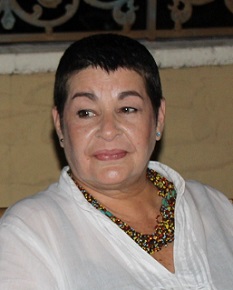
María Elena Cruz Varela (Colón, 17 augustus 1953)
De Nederlandse dichter en kunsthistoricus Jan Ameling Emmens werd geboren in Rotterdam op 17 augustus 1924. Zie ook alle tags voor Jan Emmens op dit blog.
Vogel
De bomen kregen een betekenis
die zij nog zacht gebarend wilden weren,
maar 't noodlot was niet meer te keren;
een vogel streek klapwiekend in de wildernis
van takken neer en nu hij roerloos zit
(het licht wordt zo benauwend wit),
denk ik aan dood, verrotte geur van blaren,
hetzelfde zijn op steeds dezelfde plaats...
Hoe komt wie vliegt ooit tot bedaren,
en wie niet vliegt ooit van zijn plaats?
Voor de kade
Voor de kade wisselt een wolk meeuwen
als strooibiljetten op een sterke wind
van aanblik als 't verloop van eeuwen.
Het is windstil. De wind is een klein kind
dat met geluidjes brood staat uit te strooien.
Zijn tijd aan denken of aan doen vergooien
verschilt niet veel, 't is stenen toch voor brood.
Word liever kind: twee beentjes en wat rood;
het doet soms eeuwen inderhaast ontdooien.
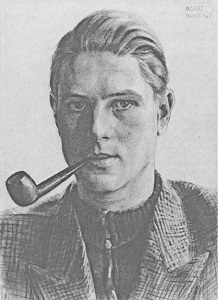
Jan Emmens (17 augustus 1924 – 12 december 1971)
Jan Emmens in 1947, getekend door Acket
De Nederlandse dichter en schilder Hendrik de Vries werd geboren in Groningen op 17 augustus 1896. Zie ook alle tags voor Hendrik de Vries op dit blog.
Zonsopgang
Augustustulpen geuren. 't Hemelruim is heet.
De pleinen openen plaveisels, wit en breed,
Met kroon-gebouwen.
In de kamersfeer, door lampen
Verweeld'rigd, krampt een pauweveer.
Fonteinen dampen.
De stralen waaieren en sneeuwen. Treinen razen.
Verwijderd aarzelt meeuwgekrijsch.
De strakke wazen
Der vleugeldeuren spiegelen verkeersgedrangen.
De schal der wereldstad, van zonnekoorts bevangen,
Verhevigt om het hart. Op zerk- en asphalt-vlakken
Verfellen reeksen glas. De nevelen verzwakken.
De vijvers breken door 't kastanjepark als linten.
De lanen ademen 't geluk der hyacinten.
Lief en vriendelijk toch van zon en maan
Lief en vriendelijk toch van zon en maan,
Overal met ons mee te gaan,
En dat bij deze winterkou;
Heel die lange lange stille laan
En zooveel sterren er achteraan!
Wij blijven staan - zij blijven staan.
Daar vallen vlinders, wit en blauw.
Waar komen die vandaan?
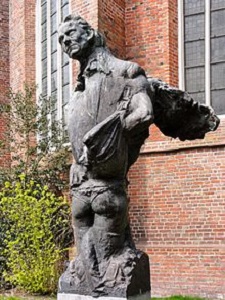
Hendrik de Vries (17 augustus 1896 – 18 november 1989)
Standbeeld door Norman Burkett naast de Martinikerk in Groningen
Zie voor nog meer schrijvers van de 17e augustus ook mijn blog van 17 augustus 2016 en ook mijn blog van 17 augustus 2014 deel 2.
|



